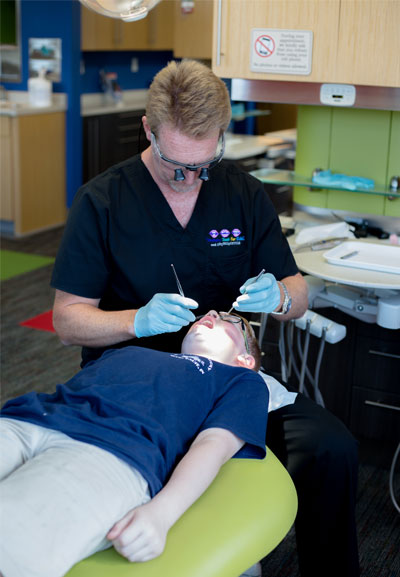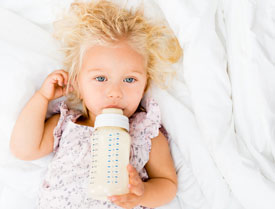Welcome To Our Pediatric Dental Office!
At Dentistry Just For Kids + TK Orthodontics, we believe that a healthy smile is important at all ages, which is why we are proud to provide pediatric dental care to patients as young as one year old, children, teens and children with special health care needs. From your child’s very first visit to the dentist, and throughout their adolescence, we strive to create a dental experience that is fun, affordable, interactive and effective. We focus on preventive care to help each child grow a healthy smile. Here at Dentistry Just For Kids + TK Orthodontics, we would love to lay the foundation for your child’s dental care.
Making the Dentist Fun

Here at DJ4K+TKO, we believe that going to the dentist should be fun! That is why we do everything we can to ensure that your child is comfortable and happy every time they enter our office. Our highly skilled team treats each child with patience and compassion, carefully nurturing and calming even the most apprehensive children. By promoting healthy smiles and instilling the importance of oral hygiene we hope to create a pediatric dental environment that your kids will be begging to return to.
First Visit - Your Child's Dental Home
We are so excited that you have chosen DJ4K+TKO for your children’s comprehensive dental care. Our team of pediatric dental specialists are the best in the Wabash Valley. You will find your new dental home quickly and easily in downtown Terre Haute. We recommend that your child have their first appointment within six weeks of his or her first tooth breaking through, or by their first birthday.
When you walk into our beautifully decorated office, full of kid-friendly furniture, games, books, and toys, you and your child will feel at home. Your child can enjoy movies and free arcade games while they wait, or play in our toddler room. Parents are free to sit back, relax, enjoy a cup of coffee or connect to the internet via our free Wi-Fi.
Our friendly dental team are trained to work with you and your child to form a special bond that will last throughout the years. We are always willing to answer all of your questions while we monitor your child’s growth and development. We will accentuate the importance of good oral health, treat their dental challenges, and provide a trusted place in times of dental emergencies.
Your child’s first visit by age 1 will allow us to begin this special relationship by introducing them to our dental team and discussing with you proper infant oral health. We will start early to teach you and your child the lifelong dental habits you need to prevent tooth decay and maintain a healthy mouth.
What You Can Do To Make Your Child’s First Visit Enjoyable and Positive
We take pride in providing your child a productive, enjoyable experience during their visits to our office. You can help prepare your child for their dental visits by:
- Discussing the visit using positive language and enthusiasm, making it exciting for your child. Make it a special occasion by allowing your child to choose his or her own clothes for the visit, and brushing especially well so that they can “show off” their teeth to the dentist.
- Explaining how the visit will work and what we will do during the visit. Let them know that we will simply count, brush and then take pictures of their teeth so your child will understand. Often you can find videos or books on the subject and expose them to your child.
- Not being anxious about your child’s appointment. Your child will know if you are not relaxed and at ease.
- Not using “scary” language when talking about your visit to the dentist, such as words like hurt, drill or shot. We work to use words that let the child know what we are doing, but they are less frightening.
Early Infant Oral Care
Infant Oral Health
 The American Academy of Pediatric Dentistry
(AAPD) recommends that all pregnant women receive oral healthcare and counseling during
pregnancy. Research has shown evidence that periodontal disease can increase the risk of preterm
birth and low birth weight. Talk to your doctor or dentist about ways you can prevent
periodontal disease during pregnancy.
The American Academy of Pediatric Dentistry
(AAPD) recommends that all pregnant women receive oral healthcare and counseling during
pregnancy. Research has shown evidence that periodontal disease can increase the risk of preterm
birth and low birth weight. Talk to your doctor or dentist about ways you can prevent
periodontal disease during pregnancy.
Additionally, mothers with poor oral health may be at a greater risk of passing the bacteria which causes cavities to their young children. Mother's should follow these simple steps to decrease the risk of spreading cavity-causing bacteria:
- Visit your dentist regularly.
- Brush and floss on a daily basis to reduce bacterial plaque.
- Proper diet, with the reduction of beverages and foods high in sugar & starch.
- Use a fluoridated toothpaste recommended by the ADA and rinse every night with an alocohol-free, over-the-counter mouth rinse with .05 % sodium fluoride in order to reduce plaque levels.
- Don't share utensils, cups or food which can cause the transmission of cavity-causing bacteria to your children.
- Use of xylitol chewing gum (4 pieces per day by the mother) can decrease a child’s caries rate.
Your Child's First Dental Visit-Establishing A "Dental Home"
The American Academy of Pediatrics (AAP), the American Dental Association (ADA), and the American Academy of Pediatric Dentistry (AAPD) all recommend establishing a "Dental Home" for your child by one year of age. Children who have a dental home are more likely to receive appropriate preventive and routine oral health care.
The Dental Home is intended to provide a place other than the Emergency Room for parents.
You can make the first visit to the dentist enjoyable and positive. If old enough, your child should be informed of the visit and told that the dentist and their staff will explain all procedures and answer any questions. The less to-do concerning the visit, the better.
It is best if you refrain from using words around your child that might cause unnecessary fear, such as needle, pull, drill or hurt. Pediatric dental offices make a practice of using words that convey the same message, but are pleasant and non-frightening to the child.
When will my baby start getting teeth?
Teething, the process of baby (primary) teeth coming through the gums into the mouth, is variable
among individual babies. Some babies get their teeth early and some get them late. In general,
the first baby teeth to appear are usually the lower front (anterior) teeth and they usually
begin erupting between the age of 6-8 months.
See
"Eruption of Your Child’s Teeth" for more details.
Baby Bottle Tooth Decay (Early Childhood Caries)
 One serious form of decay among young children
is baby bottle tooth decay. This condition is caused by frequent and long exposures of an
infant’s teeth to liquids that contain sugar. Among these liquids are milk (including breast
milk), formula, fruit juice and other sweetened drinks.
One serious form of decay among young children
is baby bottle tooth decay. This condition is caused by frequent and long exposures of an
infant’s teeth to liquids that contain sugar. Among these liquids are milk (including breast
milk), formula, fruit juice and other sweetened drinks.
Putting a baby to bed for a nap or at night with a bottle other than water can cause serious and rapid tooth decay. Sweet liquid pools around the child’s teeth giving plaque bacteria an opportunity to produce acids that attack tooth enamel. If you must give the baby a bottle as a comforter at bedtime, it should contain only water. If your child won't fall asleep without the bottle and its usual beverage, gradually dilute the bottle's contents with water over a period of two to three weeks.
After each feeding, wipe the baby’s gums and teeth with a damp washcloth or gauze pad to remove plaque. The easiest way to do this is to sit down, place the child’s head in your lap or lay the child on a dressing table or the floor. Whatever position you use, be sure you can see into the child’s mouth easily.
Sippy Cups
Sippy cups should be used as a training tool from the bottle to a cup and should be discontinued by the first birthday. If your child uses a sippy cup throughout the day, fill the sippy cup with water only (except at mealtimes). By filling the sippy cup with liquids that contain sugar (including milk, fruit juice, sports drinks, etc.) and allowing a child to drink from it throughout the day, it soaks the child’s teeth in cavity causing bacteria.






